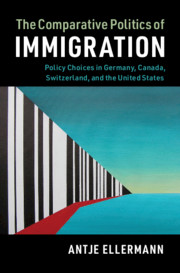 The Comparative Politics of Immigration
The Comparative Politics of Immigration Book contents
- The Comparative Politics of Immigration
- Cambridge Studies in Comparative Politics
- The Comparative Politics of Immigration
- Copyright page
- Dedication
- Contents
- Figures
- Tables
- Acknowledgments
- 1 Introduction
- 2 Theorizing Immigration Policy
- 3 The Making of Swiss Immigration Policy
- 4 The Making of German Immigration Policy
- 5 The Making of Canadian Immigration Policy
- 6 The Making of US Immigration Policy
- 7 Conclusion
- References
- Index
- Series page
6 - The Making of US Immigration Policy
Explaining Economic and Family Admissions
Published online by Cambridge University Press: 27 February 2021
- The Comparative Politics of Immigration
- Cambridge Studies in Comparative Politics
- The Comparative Politics of Immigration
- Copyright page
- Dedication
- Contents
- Figures
- Tables
- Acknowledgments
- 1 Introduction
- 2 Theorizing Immigration Policy
- 3 The Making of Swiss Immigration Policy
- 4 The Making of German Immigration Policy
- 5 The Making of Canadian Immigration Policy
- 6 The Making of US Immigration Policy
- 7 Conclusion
- References
- Index
- Series page
Summary
This chapter investigates the politics of US immigration reform from the early 1950s until the mid-2010s. The passage of the 1965 Immigration and Nationality Act marks the beginning of a policy regime anchored in family ties and occupational skill. While the 1965 Act abolished the quotas, it imposed a ceiling on western hemisphere immigration and created an immigration system dominated by family reunification, rather than employment-based admissions. The second case study examines the political process leading up to the 1990 Immigration Act which enacted historically unprecedented levels of admissions. The chapter’s third case study analyzes three failed attempts to pass comprehensive immigration reform – which encompasses economic admissions, family admissions, temporary foreign worker recruitment, border enforcement, and, most controversially, the legalization of undocumented immigrants – under the Bush and Obama presidencies. Tea Party Republicans made sure that Republican legislators would come to see any step in immigration liberalization as a potential electoral liability. Even though the growing electoral strength of Latino voters provided an important impetus for reform, in the end legislators’ lack of insulation from popular restrictionism came to determine the outcome of reform.
Keywords
- Type
- Chapter
- Information
- The Comparative Politics of ImmigrationPolicy Choices in Germany, Canada, Switzerland, and the United States, pp. 268 - 355Publisher: Cambridge University PressPrint publication year: 2021
